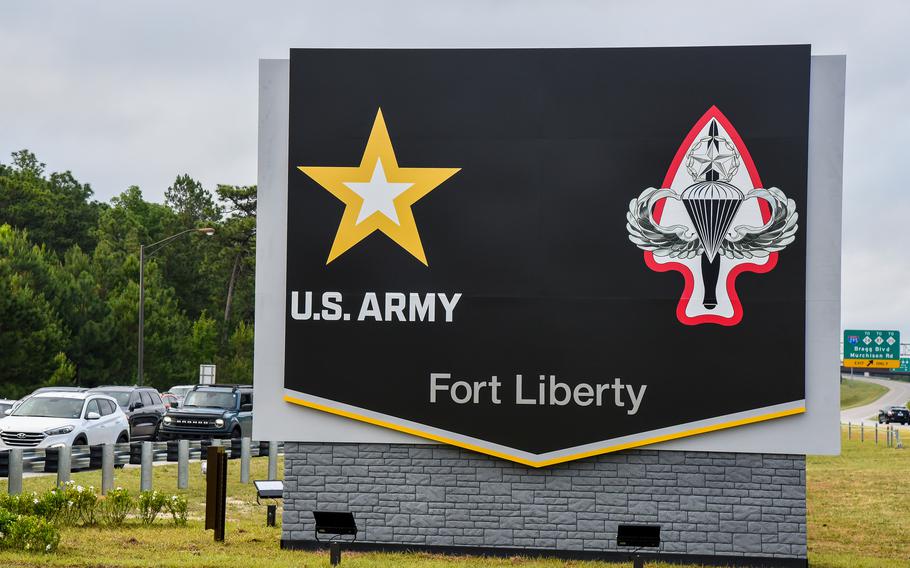
A new sign boasts the name Fort Liberty at the All American Gate at the North Carolina Army installation formerly known as Fort Bragg. The renaming of the storied post occurred Friday, June 2, 2023. (Corey Dickstein/Stars and Stripes)
Fort Liberty didn’t get much of a honeymoon. The former Fort Bragg, N.C., renamed from a Confederate to a concept on June 2, was quickly assailed by Florida Gov. Ron DeSantis and former Vice President Mike Pence, who pledged to reverse the name change if elected president. Fort Bragg, they claim, is an illustrious name tossed aside by the forces of political correctness.
DeSantis and Pence are engaged in a particularly craven culture war attack, seeking controversy and headlines – both men are trying to revive flagging campaigns for the presidency. Confederate Gen. Braxton Bragg was singularly unsuited to have one of the U.S. Army’s largest bases named in his honor. Bragg chose sedition and secession, of course, but earned not even battlefield honor with the rebel army. An inveterately argumentative and tactically inept martinet, he was hated by his officers and men. There were attempts to “frag” him even when he was a junior officer in the Mexican-American War. Bragg was belatedly relieved of command in 1863, having lost most of the battles he fought.
Fort Bragg was due for a name change from the moment it was established in 1918. But the 82nd Airborne Division, U.S. Special Operations Command, and the numerous other storied units at Fort Liberty deserve better than a home named after an anodyne idea. Luckily, the U.S. Army has a uniquely suitable candidate: Master Sgt. Changiz Lahidji.
Changiz Lahidji came to America from his native Iran at 24, speaking little English but eager to fight for his adopted country. After becoming the Army’s first Muslim Green Beret, he went on to serve more time on a Special Forces A-Team – 24 years – than any other soldier. Fighting in every American war since Vietnam, Lahidji was like Forrest Gump or, as his friends told him, Woody Allen’s “Zelig”: turning up around the world at seemingly every historic moment. His career was a true-life Hollywood movie.
While still just a corporal, Lahidji was infiltrated solo into his native Iran to gather intelligence for the failed Operation Eagle Claw, the Tehran Embassy hostage rescue mission. He invaded Granada, trained mujahideen to fight the Soviets in Afghanistan, monitored the cease-fire in Darfur, and was, by his own reckoning, 50 feet away from the eponymous helicopter crash during the “Black Hawk Down” battle in Mogadishu, Somalia, in 1993. As a soldier and later a security contractor, Lahidji deployed repeatedly to Iraq and Afghanistan. He is regarded as a legend in the special operations and military intelligence communities.
The U.S. military is in the midst of an unprecedented recruiting crisis. The Army, now shrinking involuntarily, is particularly guilty of failing to tell its story to America’s youth. “Liberty” won’t get it done (particularly in an institution that, by necessity, puts regular and sometimes severe limits on the liberty of its members). But Changiz Lahidji has a singular, and singularly American, story to tell. An immigrant who spent his first years in America pumping gas, Lahidji overcame bigotry in the barracks, survived countless combat missions and high-risk training evolutions, and became one of the senior noncommissioned officers who are the backbone of the U.S. military. “The American Dream” may be both trite and growing harder to attain, but Changiz Lahidji embodies it. His life and exploits deserve far greater publicity, and association with the U.S. Army’s public narrative. That Lahidji is still alive and able to tell his story only adds weight and urgency to the case.
As the current chief of staff of the U.S. Army, Gen. James McConville, has put it, “People are the Army.” The Army has always named its installations (and many of its premier weapons systems) after victorious generals and heroic soldiers. Fort Liberty is an unwelcome break from this tradition.
Good riddance to Fort Bragg and to the other Confederate-coded installations now being belatedly renamed. No U.S. bases should be named after men who rebelled against their own country. But Fort Liberty is a meaningless substitute. The men and women of America’s most elite Army units deserve to call Fort Lahidji home.
Gil Barndollar is a senior fellow at Defense Priorities. He served as a U.S. Marine infantry officer from 2009 to 2016.